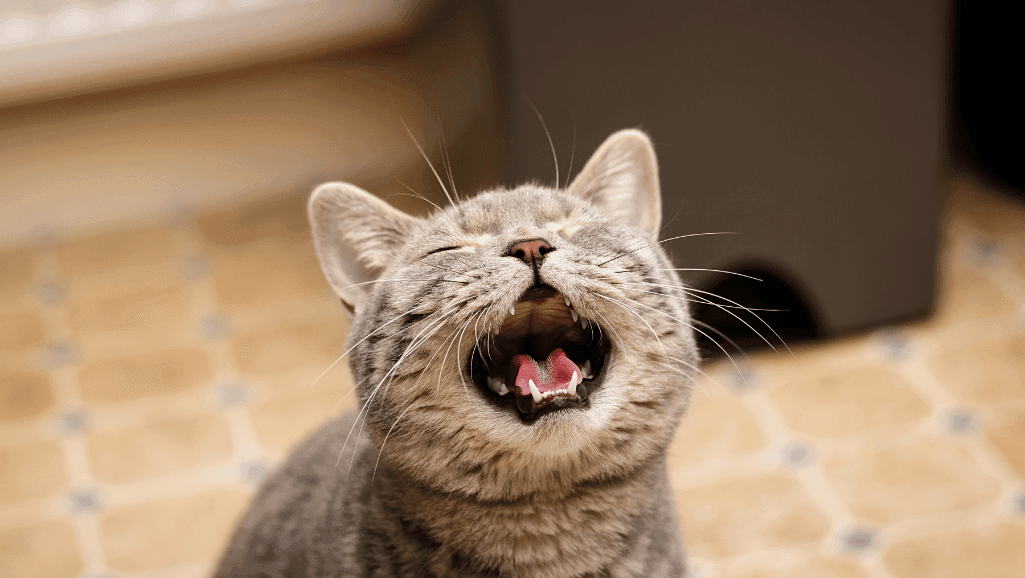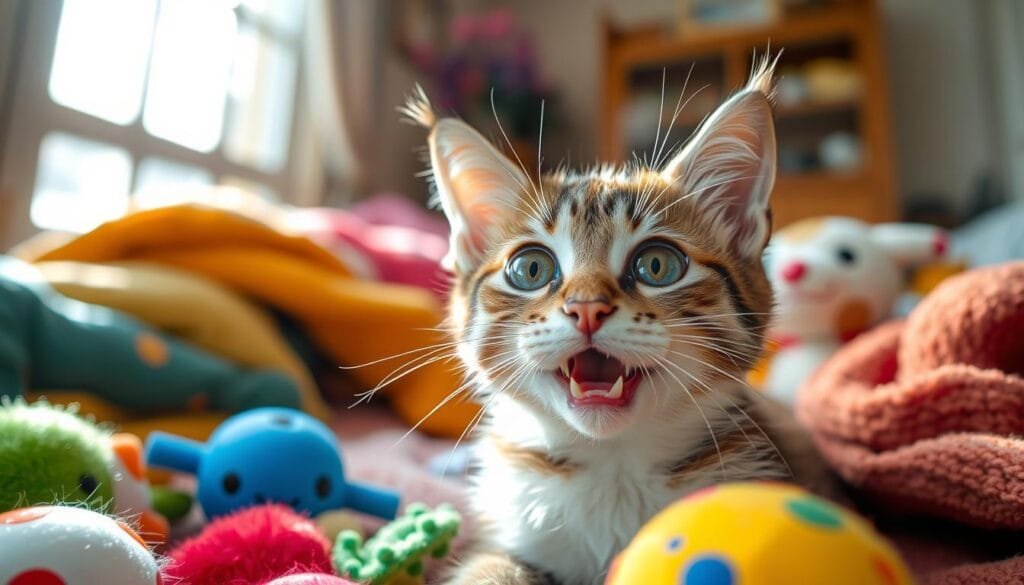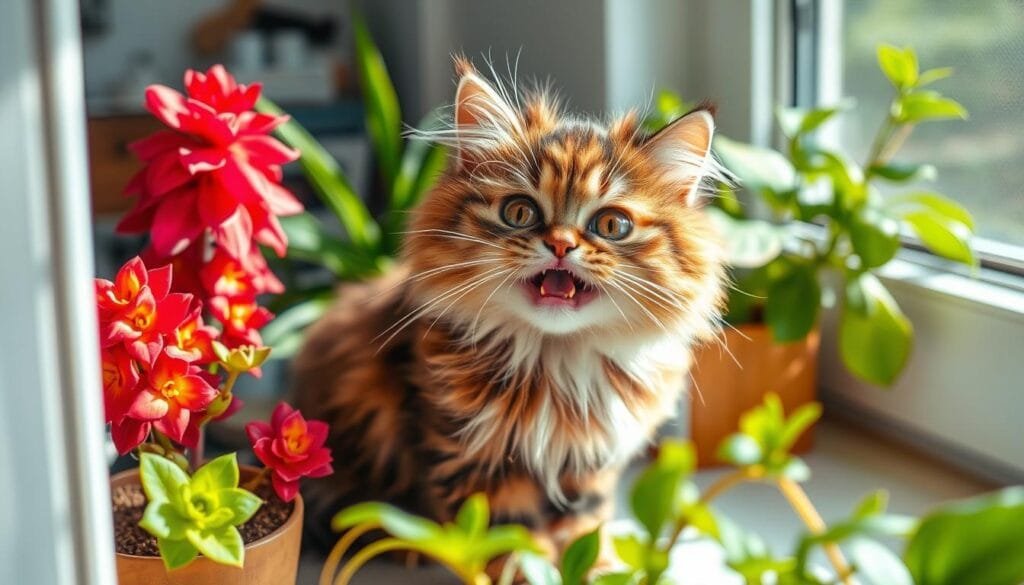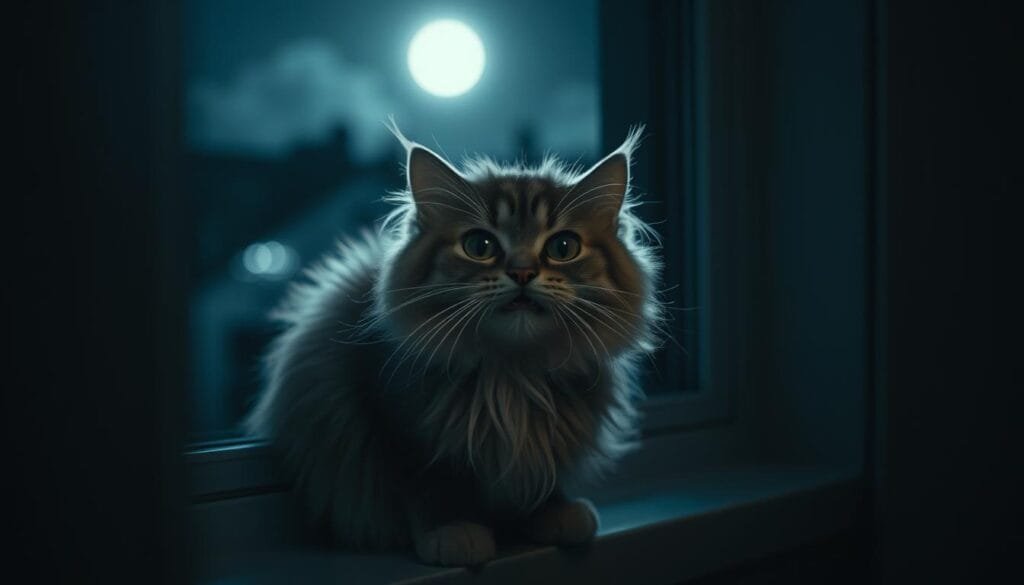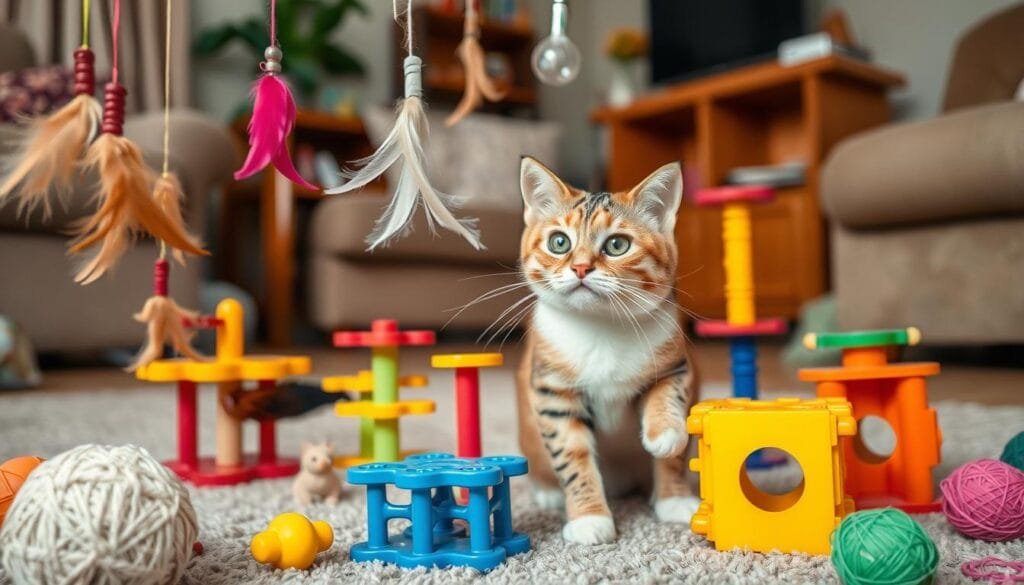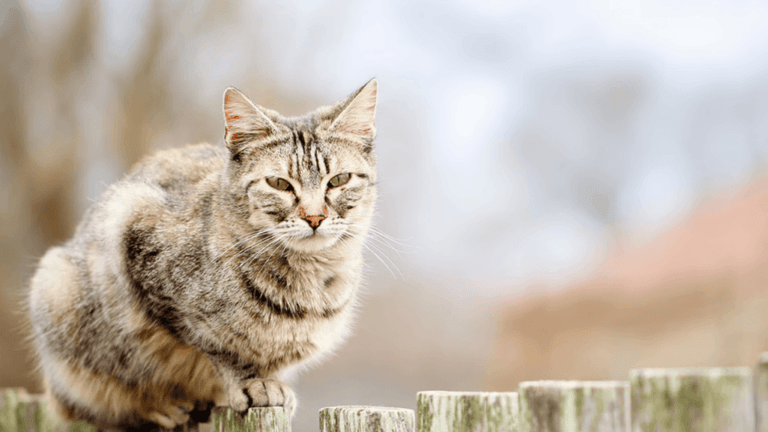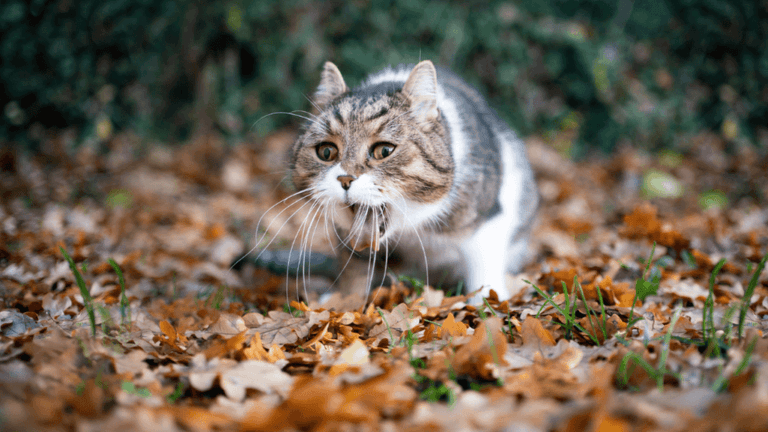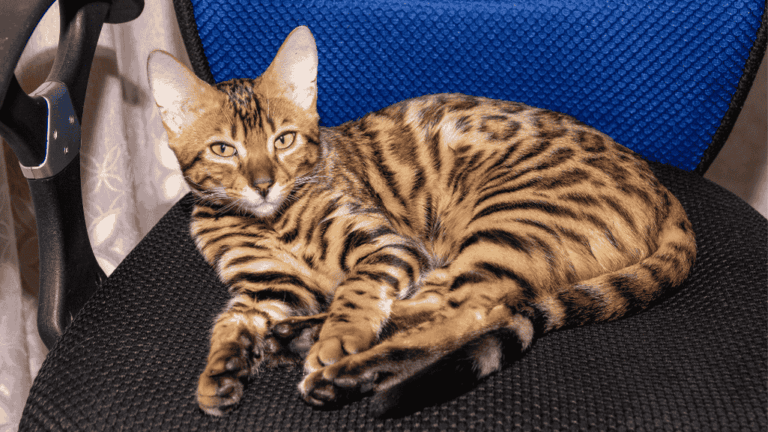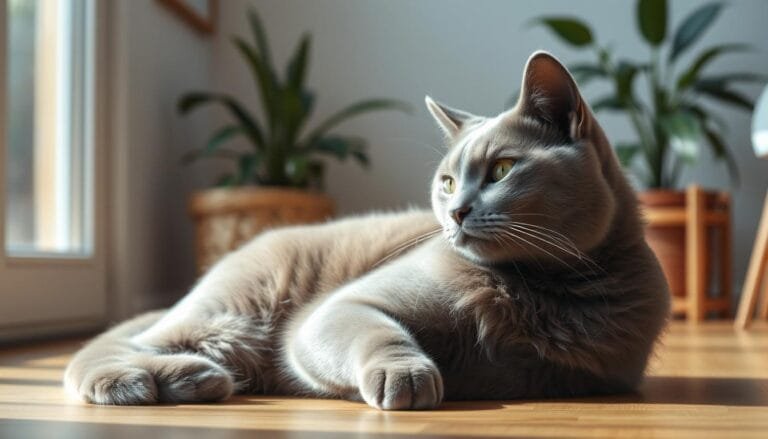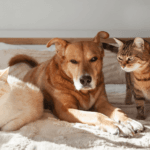Cats use meowing to talk to their humans. While some meowing is okay, too much can mean they need something. It’s important to figure out why your cat is meowing more to keep them happy and healthy. Why Is My Cat Meowing So Much?
Cats meow for many reasons, like being hungry, scared, or needing attention. They might also meow more if they’re sick, getting older, or if their environment changes. Paying attention to how and when your cat meows can help you understand what they need.
Key Takeaways:
- Excessive meowing can indicate various needs or issues, such as hunger, fear, illness, or attention-seeking behavior.
- Medical issues like kidney disease, hyperthyroidism, or cognitive dysfunction can lead to increased vocalization in cats.
- Emotional factors such as loneliness, boredom, or stress can cause cats to meow more frequently.
- Cats may meow excessively during the mating season or due to age-related changes like sensory loss.
- Identifying the underlying cause of excessive meowing is essential for addressing the issue effectively.
Understanding Feline Communication
Cats have their own special way of talking, and meowing is how they mainly talk to us. Unlike how they talk to other cats, meows are mostly for us. Knowing what different cat sounds mean can help you understand what your cat wants or needs.
Meowing as a Primary Means of Communication
Cats make many different sounds, and some are more chatty than others. Kittens who are friendly may grow up to be more vocal. Breeds like Siamese and Abyssinians are known for being very talkative.
When cats meow, they’re trying to tell us something. It could be a hello, a request for food or attention, or just a need for comfort. Adult cats might even meow like kittens when they want attention or care.
Some cats meow to say hello when we come home. They might be more vocal in their greetings. Cats can even learn to answer questions with meows, showing they understand us.
Variations in Cat Vocalizations
Cats make many different sounds, each with its own meaning. Chirps and trills are for talking to kittens. Purring means they’re happy or relaxed. But growling, hissing, and spitting show they’re upset or scared.
Yowling or howling means they’re upset or looking for their owner. Chattering or chittering shows excitement, like when they see prey. Knowing these sounds helps you understand how they feel and what they need.
“Cats are masters of subtle nonverbal communication. Their meows and facial expressions may be further developed to better communicate with humans.” – Dr. Nicholas Dodman, Animal Behaviorist
Learning about cat sounds and their meanings can make your bond stronger. If your cat meows too much or differently, it might be a sign of a problem. Always check with your vet if you notice anything odd.
Common Reasons for Excessive Meowing
Excessive meowing can signal many issues, from health problems to emotional distress. As a pet owner, knowing the reasons behind this behavior is key to your cat’s health. While some cats, like Siamese breeds, are naturally more vocal, a sudden increase in meowing often indicates an issue that requires attention.
Medical Issues: Pain, Urinary Problems, and Diseases
Medical issues are a common reason for excessive meowing. Cats may meow more when they’re in pain or discomfort. Problems like urinary tract infections, kidney disease, and hyperthyroidism can also cause increased meowing.
If your cat’s meowing is accompanied by other symptoms, such as changes in appetite, litter box habits, or behavior, it’s important to see your veterinarian quickly.
Emotional Factors: Loneliness, Boredom, and Stress
Cats are social creatures and can feel emotional distress when their needs aren’t met. Loneliness, boredom, and stress can all lead to excessive meowing. Changes in the household, like a new baby or a move, can cause anxiety in cats.
Providing your cat with enough playtime, mental stimulation, and a consistent routine can help alleviate these emotional factors.
“Cats may exhibit increased vocalization, affection, or aggression due to exposure to high levels of estrogen, such as during a heat cycle.”
Age-Related Changes: Cognitive Dysfunction and Sensory Loss
As cats age, they may face cognitive dysfunction or sensory loss. This can lead to disorientation and increased meowing. Feline cognitive dysfunction, similar to dementia in humans, can cause confusion, anxiety, and changes in sleep patterns.
Senior cats may meow excessively, often at night, due to these age-related changes. Providing a comfortable, secure environment and working with your veterinarian to manage any underlying health issues can help support your aging cat’s well-being.
Attention-Seeking Behavior
Cats are social and often meow to get attention from their owners. They might want to play, get petted, or just chat. Some cats meow too much because they’ve learned it gets them what they want, like food or playtime.
Siamese and Oriental breeds are known for their loud meows. When a cat meows and gets treats or attention, it learns to do it more. This can turn into a bad habit, leading to too much meowing.
Cats Meowing for Food, Water, or Playtime
One reason for too much meowing is a cat’s hunger for food or treats. But, treats should only make up 10% of their daily calories. It’s better to give them several small meals than one big one.
Cats may also meow a lot when they want to play or get attention. Changes in the home, like a new pet, can stress them out. Sometimes, meowing too much can even mean they’re in pain or getting older.
Learned Behavior and Positive Reinforcement
To stop too much meowing, don’t give in to it. Instead, reward them when they’re quiet and calm. Dr. Houpt says it takes about 20 times to teach a cat what’s expected of them.
“Clicker training can be an effective tool for teaching a cat new behaviors and redirecting their attention from excessive meowing.”
By rewarding good behavior and ignoring bad, you can teach your cat better ways to ask for things. If meowing doesn’t stop or seems to be a problem, see a vet or animal behaviorist for help.
Why Is My Cat Meowing So Much
If your cat is meowing a lot, it’s important to find out why. The ASPCA says there are many reasons, like health issues, environmental changes, and routine shifts.
Ruling Out Medical Causes
First, check if your cat’s meowing is due to health problems. Studies show 85% of sudden meowing might mean a health issue. Taking your cat to the vet regularly is key to catch these problems early.
As cats get older, they might develop health issues like an overactive thyroid or kidney disease. These can make them meow more.
Identifying Environmental Triggers
After checking for health issues, look at your cat’s environment. About 56% of cats meow more due to stress from changes in their surroundings. Dirty litter boxes, lack of play, or feeling threatened can cause them to meow a lot.
Keeping their environment clean and stimulating can help. Also, addressing any stressors can make a big difference.
Assessing Changes in Routine or Family Dynamics
Cats like routine, and changes can upset them. New pets, babies, moving, or losing a family member can stress them out. In fact, 67% of cats meow more when they’re alone for too long.
By spending more time with your cat, introducing changes slowly, and keeping a regular routine, you can help them adjust. This can reduce their meowing.
Nighttime Meowing and Sleep Disturbances
When your cat meows at night, it can disturb your sleep. Cats are most active at dusk and dawn. But, if they meow too much at night, it might mean they have health issues.
Dr. Ellen Lindell, VMD, DACVB, says cat yowling at night is a big reason for vet visits. 85% of nighttime meowing in cats is due to physical or health problems. These can be thyroid issues, kidney problems, diabetes, arthritis, tooth pain, and more.
Older cats are more likely to have health problems. They might also lose their hearing, making them meow louder. It’s important to see a vet to check for health issues.
Behavioral factors can also cause sleep problems. Boredom, hunger, and lack of social interaction can lead to meowing at night. Choosing the right cat breed and proper care can help.
“Cats are social animals and may meow at night if they lack social interaction during the day.” – Dr. Lindell
To stop nighttime meowing, try these tips:
- Give your cat enrichment toys, like interactive toys, cat trees, and scratchers, to keep them busy during the day.
- Feed your cat later in the evening and give them two portions to keep them full at night.
- Play with your cat using wand toys in the evening to reset their hunting clock.
- Make sure your cat can easily find the litter box and have safe spaces to reduce anxiety.
- Spend time with your cat during the day, playing and interacting with them.
Understanding why your cat meows at night and addressing their needs can help. This way, you and your cat can both get better sleep.
Addressing Excessive Meowing
Excessive meowing can be tough for cat owners. But, there are ways to tackle this issue. By giving your cat mental stimulation, a consistent routine, and positive training, you can cut down on meowing. This makes for a happier home.
Providing Mental and Physical Stimulation
One effective way to stop meowing is to keep your cat’s mind and body active. Play with them using toys like laser pointers or puzzle feeders. This keeps them engaged and happy.
Also, make sure your cat has places to scratch, climb, and hide. This keeps them entertained and mentally sharp.
Studies show that cats left alone may meow more. By giving them fun toys and activities, you can prevent boredom and loneliness. This reduces meowing.
Establishing a Consistent Routine
Cats love routine. A set schedule for meals, play, and grooming helps them feel secure. Feeding them regularly can stop them from meowing for food.
“Cats are creatures of habit, and a predictable routine can provide them with a sense of security and comfort.”
Make sure to play with your cat every day. This keeps them active and happy. A regular routine also reduces stress and meowing.
Positive Reinforcement Training Techniques
Positive training is key in changing your cat’s behavior. Reward them with treats or praise when they’re quiet. This teaches them that being calm is good.
But, don’t reward meowing for attention. Cats should only get attention when they’re quiet. Ignore meows for attention and reward quiet behavior. This helps them learn to be quieter.
Every cat is different. The best way to stop meowing may vary. If your cat’s meowing doesn’t stop, talk to your vet. They can offer advice and help.
For more on how to handle excessive meowing, check out this resource.
Conclusion
Understanding cat meowing is vital for a happy and healthy cat. Excessive meowing can mean many things, like health issues or emotional problems. By checking for health problems and finding what causes the meowing, you can help your cat.
Keeping your cat’s mind and body active is important. A regular routine and positive training help manage meowing. These steps can make a big difference.
Cats are unique, with different personalities and needs. Some, like Bengals, Ocicats, and Savannahs, meow more than others. Senior cats might meow more at night due to age.
By knowing your cat’s usual meows and any changes, you can spot and fix problems fast. This way, you can keep your cat happy and quiet.
Building a strong bond with your cat is key. Learn their language and meet their needs. This creates a loving space for both you and your cat to flourish.
Remember, a happy cat is a quiet cat. Tackling excessive meowing is a big part of being a caring pet owner.

